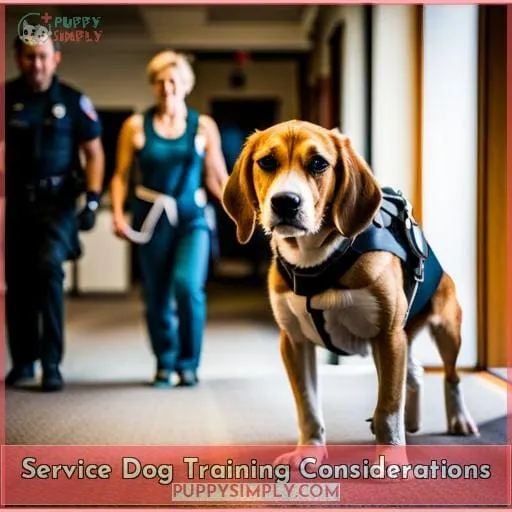This site is supported by our readers. We may earn a commission, at no cost to you, if you purchase through links.
 Beagles are certainly a popular breed, but do they make good service dogs?
Beagles are certainly a popular breed, but do they make good service dogs?
You’re probably curious about their ability to assist with tasks that benefit those with disabilities.
While they’re intelligent and trainable, their distractibility raises concerns.
Let’s delve into the pros and cons of Beagles as service dogs, exploring their potential roles, reliability, and suitability for various disabilities.
By the end, you’ll have a clearer understanding of whether a Beagle is the right fit for your service dog needs.
Table Of Contents
- Key Takeaways
- What Makes a Good Service Dog?
- Are Beagles Smart and Trainable Enough?
- What Tasks Can a Beagle Service Dog Perform?
- Are Beagles Reliable Off-Leash?
- What Disabilities Can a Beagle Assist With?
- Can Any Dog Be a Service Dog?
- Service Dog Training Considerations
- Laws and Regulations for Service Dogs
- Finding the Right Service Dog
- Frequently Asked Questions (FAQs)
- What is the cost of acquiring and training a beagle service dog?
- How do I get my beagle certified as an official service dog?
- What are some challenges or disadvantages to having a beagle as a service dog?
- How much time per day will I need to dedicate to training my beagle service dog?
- What should I do if my beagle service dog misbehaves or fails to perform its duties in public?
- Conclusion
Key Takeaways
- Beagles can be trained as service dogs, but their scent drive can pose training challenges.
- Beagles can assist people with mobility limitations, medical alerts, psychiatric issues, and more.
- Laws allow service dogs public access and travel rights, but psychiatric service dogs lack some protections.
- Training beagles as service dogs requires selecting the right temperament, professional training, and dedicated management of their distractibility.
What Makes a Good Service Dog?
You need certain qualities like intelligence, trainability, focus, and temperament control when evaluating what makes a good service dog.
A dog’s trainability and ability to bond closely with their handler are key for performing specialized tasks consistently.
We assess temperament qualities like low reactivity and friendliness during training to predict suitability for public access work.
The dog should demonstrate calmness, attentiveness, and tolerance of distractions while learning tasks assisting with mobility, medical alerts, or psychiatric disorders.
Ongoing reinforcement maintains the dog’s focus, performance standards, and strong work drive.
Appropriate breed selection and socialization build confidence managing different environments encountered working with a disabled handler.
Consistency meeting ADA regulations for public access develops a service dog able to mitigate their partner’s challenges and facilitate independence.
Are Beagles Smart and Trainable Enough?
When considering a Beagle’s suitability as a service dog, you’ll need to examine if they’re smart and trainable enough for the intensive service dog role.
While beagles are intelligent dogs, their strong prey drive and scent orientation can pose training challenges requiring dedicated distraction management.
Their cognitive abilities allow them to learn complex tasks, but their behavioral adaptability is key for performing those tasks reliably.
Beagles can focus well when properly motivated, but their tendency towards distraction must be properly managed through training tailored to their breed traits.
With diligent training utilizing positive reinforcement methods, beagles can learn to concentrate despite stimuli and show the task focus needed in a psychiatric service dog.
However, their training requires more effort than inherently focused breeds.
Evaluating if your prospective beagle service dog can handle this intensive training is crucial before embarking on the process.
What Tasks Can a Beagle Service Dog Perform?
As a smart and eager-to-please breed, Beagles can be trained to perform various service dog tasks.
Their strong sense of smell makes them excellent at retrieval work and alerting to sounds or scents that may indicate danger or an impending anxiety attack.
Beagles also have the gentle temperament required to provide critical emotional support for those with psychiatric issues like depression, anxiety, and PTSD.
Retrieval
As a Beagle service dog, one task it can perform for you is retrieval of items you may have difficulty reaching or picking up.
With proper retrieval training, a Beagle can learn to fetch dropped objects like phones, keys, medication bottles, or assistive devices.
Consistent practice and positive reinforcement help a Beagle service dog master this skill while avoiding distractions during training and task performance.
Alerting
Another crucial task your Beagle service dog can perform is alerting you to important sounds.
However, their naturally curious and easily distracted temperament can pose training challenges.
With dedication and positive reinforcement, they can learn to focus on providing alerting assistance and emotional support when needed.
Training Area: Focus
Challenge: Easily distracted by smells and sounds
Approach: Use treats, praise, gentle corrections
Training Area: Reliability
Challenge: May get off-task when excited or bored
Approach: Practice often, be patient yet firm
Training Area: Motivation
Challenge: Independent nature reduces desire to please
Approach: Make training fun with favorite toys/games
Psychiatric Support
Providing comfort during anxiety attacks or depressive episodes requires a calm, attentive demeanor that plays to the Beagle’s innate strengths.
Their affectionate, sensitive natures can provide needed emotional support to owners with psychiatric issues.
However, their strong sniffing drive may prove distracting, so comprehensive training is essential to focus them on critical support tasks.
Still, their loving temperament equips them to shine as psychiatric service dogs for many.
Are Beagles Reliable Off-Leash?
While beagles possess many qualities that lend themselves well to service work, their reliability off-leash remains a considerable challenge for prospective disability service partners.
As hunting dogs bred to follow scents, beagles inherently struggle with recall when distracted.
Consider the realities:
- High prey drive overrides commands
- Easily drawn to food or other smells
- Difficult to refocus once on a scent
- Training not a guarantee of off-leash obedience
For disabled people requiring off-leash reliability for public access, beagles may not represent suitable service prospects without oversight.
However, for primarily home-based work, beagles can absolutely assist with critical tasks.
Explore breed traits carefully when committing to a service dog. What works wonderfully for one won’t for all.
What Disabilities Can a Beagle Assist With?
As smart and eager to please as Beagles are, they can be trained to help people with certain disabilities.
Their highly developed sense of smell allows them to detect impending seizures or low blood sugar.
Their affectionate nature can provide comfort to those with psychiatric issues like anxiety.
However, their tendency to be easily distracted could make mobility assistance difficult for the elderly or visually impaired.
Mobility Issues
One disability a Beagle can potentially assist with is mobility limitations.
You may wonder if their sturdy build and loyal nature makes them suitable for maneuvering wheelchairs or providing stability support.
However, their lack of size and strength, as well as training challenges, may hinder their ability to adequately perform heavier mobility tasks compared to larger breeds.
Smaller dogs like Beagles can still assist in limited mobility roles.
Consult an experienced service dog trainer to evaluate if a Beagle is right for your needs.
Medical Conditions
As your medical alert service dog, a Beagle can detect shifts in blood sugar or oncoming seizures and alert you to take action.
However, their strong drive to follow scents could distract them from their medical alert duties.
Consistent training helps reinforce their role, but breeds less prone to distraction may prove better service dogs over time.
Still, some Beagles s쳮d with diligent work.
Psychiatric Disorders
You’re also able to train your Beagle service dog to assist with psychiatric issues like anxiety, PTSD, and depression.
Therapy dogs provide emotional support, but service dogs are trained to perform specific tasks like deep pressure therapy for anxiety attacks or waking you from nightmares.
Selecting appropriate service dog breeds and dedicated training is crucial for mitigating psychiatric disabilities.
Can Any Dog Be a Service Dog?
Six are eligible if you’ve worked with a professional trainer who’s deemed them able to perform helpful tasks for you.
Any breed or mixed breed can potentially serve if they meet training standards for performing disability-mitigating work.
However, certain breeds tend to excel in service roles, possessing key traits like intelligence, trainability, focus, and calm temperament.
The ADA doesn’t restrict breed eligibility, but owners have a responsibility to choose and train dogs appropriate for public access–meeting legal requirements for control, behavior, and task performance.
Overall, while many dogs can assist with specific tasks, breed suitability, rigorous training, and owner responsibility factor into successful service dog partnerships.
Service Dog Training Considerations
When considering a Beagle as a service dog, it’s imperative to select dogs with calm temperaments that display trainability.
Opt for breeds biologically suited for service work, like Retrievers over Scent Hounds, to increase chances of success.
Invest in professional training to reinforce proper behaviors and ensure your dog can ignore distractions when working.
Qualities Of Good Prospects
So when you’re evaluating service dog prospects, you’ll want to look for:
- Intelligent, even-tempered pups who take readily to training, as those qualities generally make the best candidates for assistance animal work.
Temperament Assessment:
- Evaluate the pup’s temperament for suitability as a service dog.
Training Challenges:
- Consider the challenges of training a service dog and the pup’s potential to overcome them.
Behavioral Suitability:
- Assess the pup’s behavioral suitability for service dog work, including its ability to remain calm and focused in various situations.
Distraction Management:
- Evaluate the pup’s ability to manage distractions and maintain focus on its tasks.
Alternative Breeds:
- Consider alternative breeds that may be suitable for service dog work, such as poodles, golden retrievers, and Labrador retrievers.
Choosing Appropriate Breeds
When selecting a service dog, you should consider a breed well-suited to the tasks required.
Certain breeds like Labradors and Golden Retrievers are known for trainability, while herding breeds like Collies excel at decision-making. The eager-to-please nature of sporting breeds makes them ideal for retrieval. Terriers and hounds can be more difficult to train and are easily distracted by smells, so they may not be the best choices.
Breed Selection Criteria:
- Trainability and focus: Crucial for learning tasks
- Calm temperament: Reduces distractions and reactivity
- Moderate energy: Prevents hyperactivity issues
- Sociability: Allows public access without aggression
- Size and strength: Matches client’s needs
Effective Training Strategies
Your service dog’s training requires dedication and consistency to reinforce desired behaviors.
- Keep training sessions short and focused.
- Manage distractions to maintain attention.
- Use positive reinforcement for good behavior.
Build a strong bond between handler and dog.
Laws and Regulations for Service Dogs
Although you have rights under the Americans with Disabilities Act when you’re paired with a service dog, you should know that psychiatric service dogs don’t have the exact protections that other service dogs do.
You can expect travel accommodations like access to public transportation and relief areas in airports when traveling with your psychiatric service dog.
Workplace inclusion allows you to bring your PSD to work. However, employers aren’t required to accommodate any disruption your dog causes.
You have public access rights, but may still face occasional discrimination issues from businesses denying you entry.
Currently, there are no national standards for psychiatric service dog training or certification.
Some states have criminal penalties for misrepresenting pets as service animals.
Inform yourself on the ADA so you can advocate for your rights.
Finding the Right Service Dog
Finding the right service dog begins with understanding your needs and carefully selecting a breed whose temperament and abilities are a good match.
You’ll want to consider breeds known for trainability, focus, and calmness around distractions.
While beagles can be taught many useful tasks, their inclination to follow scents poses off-leash challenges that may disqualify them as service dogs for some people.
Instead, explore breeds bred to work closely with humans, like Golden Retrievers, Labradors, Poodles, or Collies.
Schedule temperament tests with rescue groups and breeders.
Enroll early in service dog training programs that suit your disability.
Patience and commitment are crucial – it can take up to two years to develop the focus and public access skills service dogs need.
But finding the right canine partner willing and able to assist you can greatly increase independence and quality of life.
Frequently Asked Questions (FAQs)
What is the cost of acquiring and training a beagle service dog?
The cost of a professionally trained beagle service dog typically ranges from $15,000 to $30,
You’ll also have ongoing expenses for:
- Food
- Medical care
- Equipment
- Training maintenance
Consider your budget carefully before pursuing this path.
How do I get my beagle certified as an official service dog?
You’ll need to have your Beagle trained and certified by an accredited service dog organization.
They’ll evaluate your dog’s training and public access skills to determine if he meets the standards required of service animals.
Consistent training and proofing of commands are key.
What are some challenges or disadvantages to having a beagle as a service dog?
While spirited and passionate, beagle’s impulsiveness can hinder service dog tasks.
Strong noses lead them astray.
Abundant energy demands vigorous activity.
That energetic nature also brings incredible joy, if properly channeled.
They’ll keep you moving forward.
How much time per day will I need to dedicate to training my beagle service dog?
You’ll need to dedicate at least 1-2 hours per day to train your beagle service dog.
Consistency and repetition are key to:
- Reinforcing commands
- Building reliability off-leash
- Ensuring your dog can perform required tasks anywhere
Plan to actively train and socialize daily.
What should I do if my beagle service dog misbehaves or fails to perform its duties in public?
If your Beagle misbehaves in public, don’t panic.
Stay calm, redirect their attention, and reward positive behaviors.
Consistent training is key.
Focus on strengthening obedience.
With patience and persistence, your devoted companion can learn to excel as your service dog.
Conclusion
Ultimately, Beagles can make wonderful service dogs with proper training and the right handler match.
Their intelligence, eagerness to please, and adaptability give them potential.
However, their strong scent drive and distractibility require patience and commitment.
Consider a Beagle’s pros and cons carefully when deciding if they’re the best fit.
The perfect service dog lies in finding the breed whose strengths align with your unique needs.















